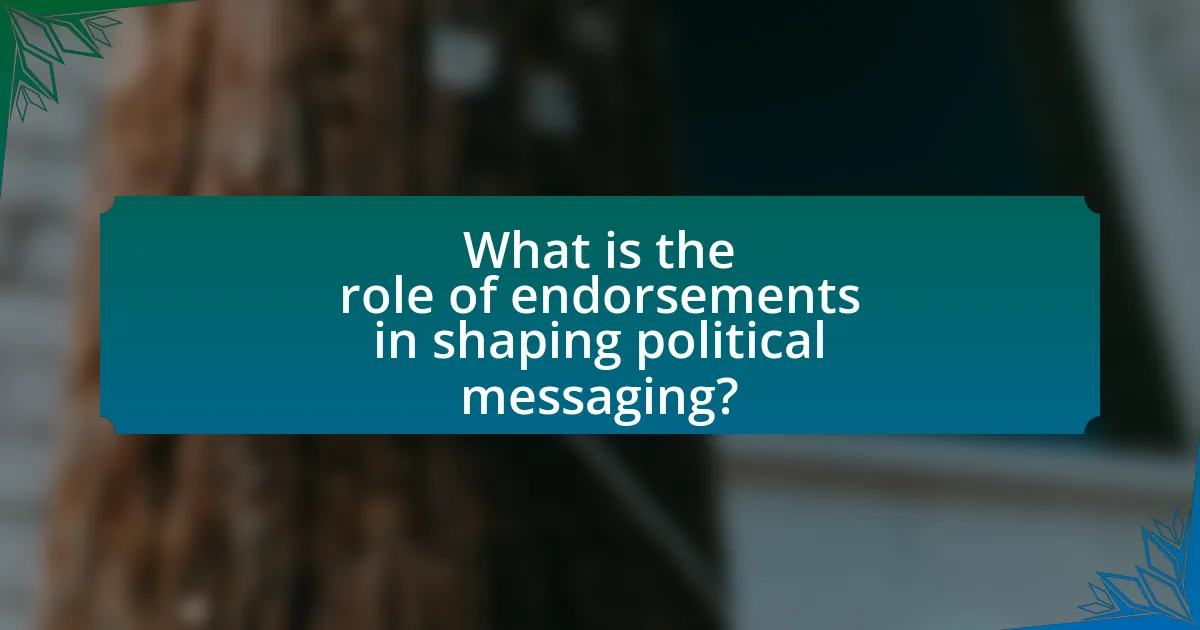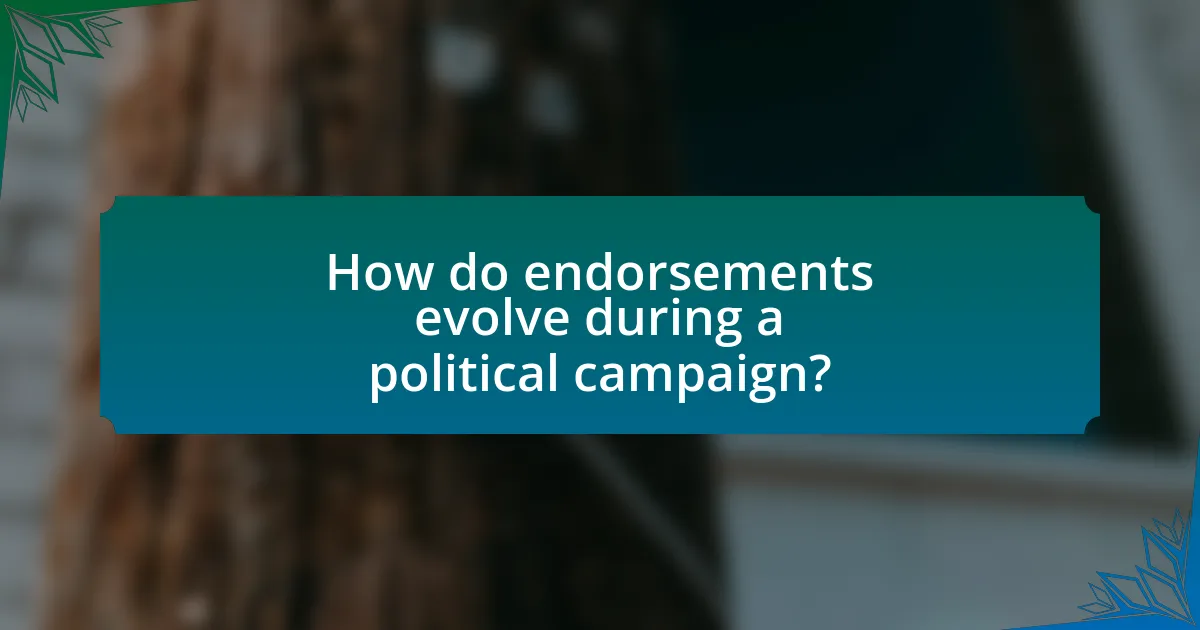The article examines the critical role of endorsements in shaping political messaging, highlighting how they enhance candidate credibility and influence voter perceptions. It discusses various types of endorsements, including individual, organizational, and celebrity endorsements, and their psychological impact on voters. The article also explores the importance of endorsements in campaign strategies, their historical significance, and the potential drawbacks, such as misalignment with endorsers’ values. Additionally, it addresses how endorsements evolve during campaigns, the influence of social media, and best practices for candidates to effectively leverage endorsements to maximize their impact.

What is the role of endorsements in shaping political messaging?
Endorsements play a crucial role in shaping political messaging by enhancing credibility and influencing voter perceptions. When a respected figure or organization endorses a candidate, it signals to voters that the candidate is trustworthy and aligns with certain values or policies. For instance, endorsements from prominent political figures can significantly boost a candidate’s visibility and appeal, as seen in the 2008 U.S. presidential election when Barack Obama received endorsements from influential leaders, which helped solidify his message of change and hope. Additionally, research indicates that endorsements can sway undecided voters, as they often rely on trusted sources for guidance in their decision-making process.
How do endorsements influence voter perceptions?
Endorsements significantly influence voter perceptions by enhancing the credibility and appeal of candidates. When a respected individual or organization endorses a candidate, it often leads voters to view that candidate more favorably, as endorsements serve as a heuristic or shortcut for decision-making. Research indicates that endorsements can sway undecided voters, with studies showing that candidates receiving endorsements from well-known figures can experience an increase in support by as much as 10-15%. This effect is particularly pronounced in competitive races, where endorsements can differentiate candidates and signal trustworthiness and competence.
What psychological factors make endorsements effective?
Endorsements are effective due to psychological factors such as credibility, social proof, and emotional appeal. Credibility arises when a trusted figure supports a product or idea, enhancing its perceived value; for instance, research shows that endorsements from experts can increase consumer trust by up to 50%. Social proof occurs when individuals look to others’ behaviors to guide their own decisions, making endorsements powerful in influencing public opinion, as demonstrated by studies indicating that people are more likely to support a candidate endorsed by a popular figure. Emotional appeal engages audiences on a personal level, often leading to stronger connections and increased persuasion, with data suggesting that emotionally charged endorsements can boost message retention by 70%.
How do endorsements affect trust in political candidates?
Endorsements significantly enhance trust in political candidates by leveraging the credibility of the endorsers. When a respected figure or organization endorses a candidate, it signals to voters that the candidate is trustworthy and competent, as seen in studies where candidates endorsed by well-known political figures or organizations experience increased voter confidence. For example, a 2016 study published in the Journal of Political Marketing found that endorsements from local leaders positively influenced voters’ perceptions of candidates’ integrity and reliability. This demonstrates that endorsements serve as a powerful tool in shaping public trust and can sway electoral outcomes.
Why are endorsements important in political campaigns?
Endorsements are important in political campaigns because they lend credibility and influence to a candidate, often swaying undecided voters. When a respected figure or organization endorses a candidate, it signals to the electorate that the candidate is trustworthy and has the support of established leaders. For instance, endorsements from prominent political figures can significantly boost a candidate’s visibility and perceived legitimacy, as seen in the 2008 presidential campaign when Barack Obama received endorsements from influential figures like Ted Kennedy, which helped solidify his position among Democratic voters.
What historical examples illustrate the impact of endorsements?
Historical examples illustrating the impact of endorsements include the 1960 presidential election, where John F. Kennedy received significant support from prominent figures like Martin Luther King Jr., which helped him gain traction among African American voters. Additionally, in the 2008 election, Barack Obama was endorsed by influential figures such as Oprah Winfrey, which contributed to his appeal and visibility, particularly among younger voters. These endorsements not only amplified the candidates’ messages but also shaped public perception and voter behavior, demonstrating the powerful role endorsements play in political messaging.
How do endorsements contribute to campaign strategies?
Endorsements significantly enhance campaign strategies by providing credibility and expanding reach. When a well-respected individual or organization endorses a candidate, it signals to voters that the candidate is trustworthy and aligns with their values. For instance, endorsements from influential figures can sway undecided voters, as seen in the 2008 U.S. presidential election when Barack Obama received endorsements from prominent figures like Oprah Winfrey, which contributed to his increased visibility and support. Additionally, endorsements can help campaigns tap into the endorser’s network, thereby broadening their audience and increasing engagement. This strategic leverage of endorsements is crucial for shaping political messaging and influencing voter perceptions.

What types of endorsements exist in political messaging?
There are several types of endorsements in political messaging, including individual endorsements, organizational endorsements, and celebrity endorsements. Individual endorsements typically come from influential figures, such as politicians or community leaders, who lend their credibility to a candidate. Organizational endorsements are provided by groups, such as labor unions or advocacy organizations, which can mobilize their members to support a candidate. Celebrity endorsements leverage the popularity of public figures to attract attention and sway public opinion. Each type of endorsement plays a significant role in shaping voter perceptions and can enhance a candidate’s visibility and legitimacy in the political arena.
How do celebrity endorsements differ from political endorsements?
Celebrity endorsements primarily aim to promote products or brands, leveraging the star power of the celebrity to influence consumer behavior, while political endorsements focus on supporting candidates or policies to sway public opinion and voter behavior. The effectiveness of celebrity endorsements is often measured by increased sales or brand awareness, as seen in campaigns where celebrities like Beyoncé or George Clooney have significantly boosted product visibility. In contrast, political endorsements, such as those from figures like Barack Obama or Bernie Sanders, are intended to lend credibility and attract voters, often impacting election outcomes, as evidenced by studies showing that endorsements can increase voter turnout by up to 10%.
What role do grassroots endorsements play in local elections?
Grassroots endorsements play a crucial role in local elections by enhancing candidate credibility and mobilizing voter support. These endorsements, often from community leaders or local organizations, signal to voters that a candidate has genuine community backing, which can influence perceptions and increase trust. For instance, a study by the Pew Research Center found that endorsements from local groups can significantly sway undecided voters, as they often rely on trusted sources for information about candidates. Additionally, grassroots endorsements can help candidates build a strong volunteer base, which is essential for effective campaigning at the local level.
How do party endorsements shape candidate viability?
Party endorsements significantly enhance candidate viability by providing credibility and access to resources. When a political party endorses a candidate, it signals to voters that the candidate aligns with the party’s values and policies, which can increase voter trust and support. For instance, candidates endorsed by major parties often receive increased media coverage and fundraising support, which are critical for campaign success. According to a study by the Pew Research Center, candidates with party endorsements are more likely to secure primary victories, as endorsements can sway undecided voters and mobilize party loyalists. This demonstrates that endorsements not only validate a candidate’s position but also amplify their campaign efforts, ultimately shaping their viability in elections.
What are the potential drawbacks of endorsements?
Endorsements can lead to potential drawbacks such as misalignment between the endorser’s values and the endorsed candidate’s positions. This misalignment can create voter distrust, as seen in the 2016 U.S. presidential election when several prominent endorsements were criticized for not reflecting the endorsers’ previous stances. Additionally, endorsements may alienate certain voter demographics if the endorser is perceived as out of touch or controversial, which can negatively impact a candidate’s appeal. For instance, endorsements from celebrities can sometimes backfire, as voters may view them as lacking genuine political insight.
How can negative endorsements impact a candidate’s image?
Negative endorsements can significantly damage a candidate’s image by associating them with unfavorable opinions or criticisms. When a prominent figure or organization publicly expresses disapproval of a candidate, it can lead to a loss of credibility and support among voters. For instance, a study by the Pew Research Center found that negative campaigning can sway public perception, with 60% of respondents indicating that negative information about a candidate affects their voting decisions. This association can create a perception of untrustworthiness or incompetence, ultimately diminishing the candidate’s chances of success in an election.
What happens when endorsements backfire?
When endorsements backfire, they can lead to a loss of credibility for both the endorser and the endorsed candidate. This occurs when the public perceives the endorsement as insincere or misaligned with the endorser’s values, resulting in negative backlash. For instance, a study by the Pew Research Center found that 60% of voters are influenced by endorsements, but if they feel the endorsement contradicts the endorser’s previous statements or actions, it can diminish trust and support for the candidate. This phenomenon illustrates the delicate balance in political messaging, where endorsements must align authentically with the values of both parties to be effective.

How do endorsements evolve during a political campaign?
Endorsements evolve during a political campaign by initially serving as strategic tools to build credibility and support, then adapting to reflect changing public perceptions and campaign dynamics. Early in a campaign, candidates seek endorsements from influential figures or organizations to establish legitimacy and attract voters. As the campaign progresses, endorsements may shift based on candidate performance, public opinion polls, and emerging issues, often leading to new endorsements or the withdrawal of previous ones. For example, during the 2008 U.S. presidential election, Barack Obama received endorsements from prominent figures like Ted Kennedy, which helped solidify his position against Hillary Clinton. This illustrates how endorsements can significantly influence voter perception and campaign momentum, adapting to the evolving landscape of the election.
What factors influence the timing of endorsements?
The timing of endorsements is influenced by strategic considerations, political context, and public sentiment. Political candidates often seek endorsements at critical moments, such as before elections or during pivotal campaign phases, to maximize their impact. For instance, endorsements can be timed to coincide with major events or debates to enhance visibility and credibility. Additionally, the political climate, including the urgency of issues and voter concerns, plays a significant role in determining when endorsements are made. Research indicates that endorsements are more effective when they align with the electorate’s current priorities, as seen in the 2020 U.S. presidential election, where endorsements from key figures were strategically released to sway undecided voters.
How do endorsements change as the political landscape shifts?
Endorsements change as the political landscape shifts by reflecting the evolving priorities and values of voters, as well as the strategic interests of political figures. For instance, during significant political events, such as elections or social movements, endorsements may pivot to align with emerging issues, such as climate change or social justice, which gain prominence in public discourse. Historical examples include endorsements shifting in response to the civil rights movement in the 1960s, where political figures adjusted their support to resonate with the growing demand for equality. This adaptability demonstrates that endorsements serve not only as a reflection of current political sentiments but also as a tool for candidates to enhance their appeal and relevance in a changing environment.
What role do social media play in the dissemination of endorsements?
Social media serves as a critical platform for the dissemination of endorsements by enabling rapid sharing and broad reach. Through platforms like Twitter, Facebook, and Instagram, endorsements can be communicated instantly to vast audiences, amplifying their impact. For instance, a study by the Pew Research Center found that 69% of adults in the U.S. use social media, which facilitates the quick spread of political endorsements and messages. This immediacy allows endorsements to influence public opinion and voter behavior effectively, as seen in various political campaigns where social media endorsements have significantly swayed voter perceptions and engagement.
How can candidates effectively leverage endorsements?
Candidates can effectively leverage endorsements by strategically selecting influential figures whose support aligns with their values and target audience. This alignment enhances credibility and can significantly sway undecided voters. For instance, endorsements from respected community leaders or organizations can amplify a candidate’s message, as seen in the 2008 presidential election when Barack Obama received endorsements from prominent figures like Oprah Winfrey, which helped boost his visibility and appeal. Additionally, candidates should actively promote these endorsements through various channels, including social media, campaign events, and advertisements, to maximize their impact and reach.
What strategies can candidates use to secure endorsements?
Candidates can secure endorsements by building strong relationships with influential figures and organizations. Establishing trust and demonstrating shared values with potential endorsers increases the likelihood of receiving their support. For instance, candidates can engage in networking events, participate in community activities, and maintain open communication to foster connections. Additionally, showcasing a clear and compelling vision that aligns with the interests of potential endorsers can further enhance endorsement opportunities. Research indicates that candidates who actively seek endorsements from respected leaders often experience increased credibility and voter support, as seen in various electoral campaigns where endorsements significantly influenced public perception and turnout.
How should candidates communicate endorsements to maximize impact?
Candidates should communicate endorsements through strategic messaging that highlights the credibility and relevance of the endorser. By showcasing endorsements from respected figures or organizations, candidates can enhance their perceived legitimacy and appeal to specific voter demographics. For instance, a study by the Pew Research Center indicates that endorsements from local leaders can significantly influence voter decisions, as they often resonate more with constituents than national figures. Additionally, candidates should utilize multiple platforms—such as social media, press releases, and campaign events—to disseminate endorsements widely, ensuring that the message reaches a broad audience effectively.
What best practices should candidates follow regarding endorsements?
Candidates should seek endorsements from credible and influential figures to enhance their political messaging. By aligning with respected individuals or organizations, candidates can leverage their authority and reach to gain trust and visibility among voters. Research indicates that endorsements can significantly impact voter perceptions; for instance, a study by the Pew Research Center found that 70% of voters consider endorsements when making electoral decisions. Additionally, candidates should ensure that the values and policies of the endorsers align with their own to maintain authenticity and avoid potential backlash. This strategic approach to endorsements can effectively strengthen a candidate’s campaign and resonate with the electorate.
How can candidates ensure endorsements align with their messaging?
Candidates can ensure endorsements align with their messaging by carefully selecting endorsers whose values and public personas reflect their campaign themes. This alignment is crucial because endorsements from individuals or organizations that resonate with a candidate’s core message can enhance credibility and reinforce the candidate’s narrative. For instance, a candidate focused on environmental issues should seek endorsements from well-known environmental activists or organizations, as this not only validates their stance but also attracts like-minded voters. Research indicates that endorsements can significantly influence voter perceptions, making it essential for candidates to strategically choose endorsers that complement their messaging.
What common mistakes should candidates avoid with endorsements?
Candidates should avoid the mistake of seeking endorsements from individuals or organizations that do not align with their values or target audience. Misalignment can lead to a loss of credibility and alienate potential supporters. For instance, a candidate advocating for progressive policies may face backlash if endorsed by a conservative figure, undermining their message. Additionally, candidates should refrain from over-relying on endorsements as a substitute for their own messaging; this can create an impression of dependency rather than authenticity. Research indicates that voters often prioritize candidates’ personal narratives over endorsements, highlighting the importance of maintaining a strong individual brand.


